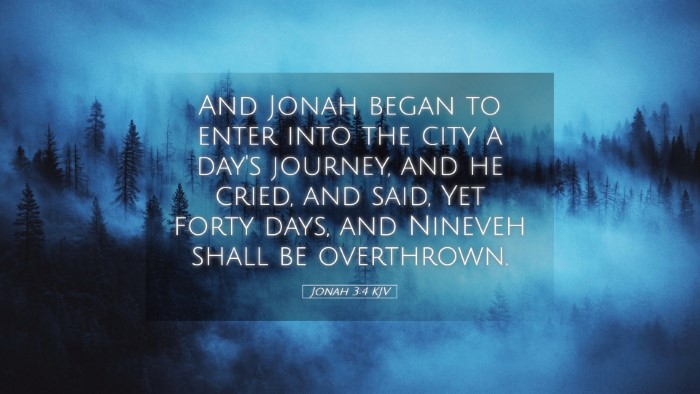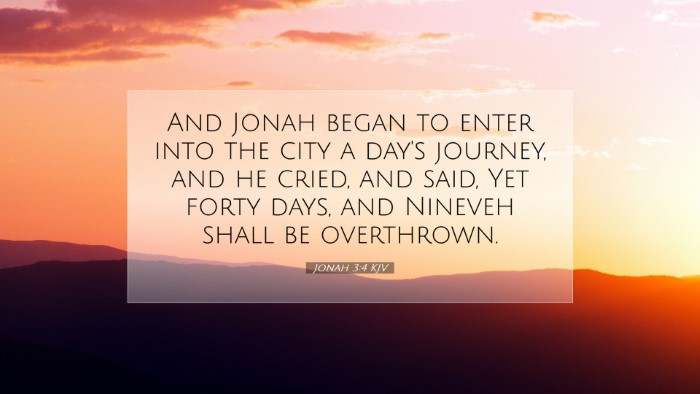Old Testament
Genesis Exodus Leviticus Numbers Deuteronomy Joshua Judges Ruth 1 Samuel 2 Samuel 1 Kings 2 Kings 1 Chronicles 2 Chronicles Ezra Nehemiah Esther Job Psalms Proverbs Ecclesiastes Song of Solomon Isaiah Jeremiah Lamentations Ezekiel Daniel Hosea Joel Amos Obadiah Jonah Micah Nahum Habakkuk Zephaniah Haggai Zechariah MalachiJonah 3:4
Jonah 3:4 KJV
And Jonah began to enter into the city a day's journey, and he cried, and said, Yet forty days, and Nineveh shall be overthrown.
Jonah 3:4 Bible Commentary
Commentary on Jonah 3:4
Jonah 3:4 states, “And Jonah began to enter into the city a day's journey, and he cried, and said, Yet forty days, and Nineveh shall be overthrown.” This verse is a pivotal moment in the book of Jonah, showcasing the prophet’s reluctant obedience and the impending judgment of Nineveh. In analyzing this text, we draw insights from various public domain commentaries.
Contextual Background
The book of Jonah is often regarded as a narrative emphasizing God's mercy, highlighting His willingness to forgive the wicked when they repent. The context of Jonah’s mission to Nineveh is crucial as Nineveh was known for its grave sins and violence. According to Matthew Henry, “Nineveh was the capital of the Assyrian empire, and their wickedness had come up before God, compelling Him to send Jonah to proclaim their impending doom.” This sets the stage for Jonah’s journey.
Jonah's Reluctance and Prophetic Message
Jonah’s task to proclaim judgment is marked by his initial flight from God’s command. However, after his encounter with the great fish and subsequent repentance, he obeys, albeit with a reluctant heart. Albert Barnes notes that “Jonah’s proclamation was simple yet profound. His message, ‘Yet forty days, and Nineveh shall be overthrown,’ was a direct announcement of God’s judgment, reflecting the seriousness of the situation.”
This warning encompassed more than mere destruction; it highlighted the urgent call for repentance. Adam Clarke elaborates on this by stating, “The term ‘overthrown’ carries the implication of being turned upside down, indicating total destruction. However, it also hints at the potential for renewal if the people chose to repent.”
Symbolism of the Number Forty
The mention of “forty days” is significant in biblical literature, often symbolizing a period of testing, trial, and preparation. Matthew Henry states, “The number forty often precedes a significant transformation; for instance, Moses’ forty days on the mountain before receiving the Law.” This can be reflective of God’s mercy as well, giving the people of Nineveh time for reflection and repentance.
Impact on Nineveh and Repentance
Jonah’s cry resonated throughout Nineveh, and the city’s response is a testament to the power of a call to repentance. As noted by Barnes, “The people of Nineveh believed God, proclaimed a fast, and put on sackcloth from the greatest to the least.” This immediate and unified action indicates the widespread conviction stirred by Jonah’s message.
Theological Reflections
This passage invites theological reflection on several key themes:
- Divine Judgment and Mercy: Jonah’s proclamation illustrates God’s justice while offering a chance for mercy through repentance.
- The Nature of Repentance: The collective response of Nineveh underscores the seriousness of coming to God in repentance, emphasizing communal rather than merely individual transformation.
- Prophetic Obedience: Jonah's journey from reluctance to obedience serves as a model for believers regarding their mission to share God’s message, regardless of personal feelings towards those receiving it.
Conclusion
Jonah 3:4 is a powerful reminder of God’s expansive grace towards even the most undeserving. The text encapsulates the urgency of urgent preachers delivering a message of repentance, demonstrating that even a reluctant prophet can be the instrument of divine change. As pastors, students, and theologians meditate on this text, it encourages a deeper understanding of God's character and the necessity of active faith in proclaiming His truths.


